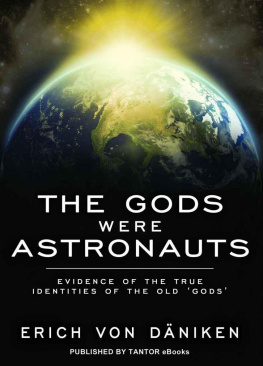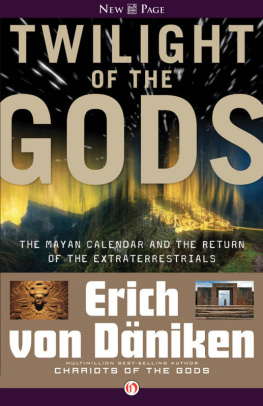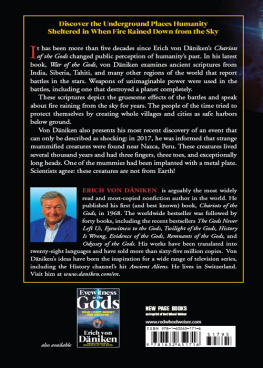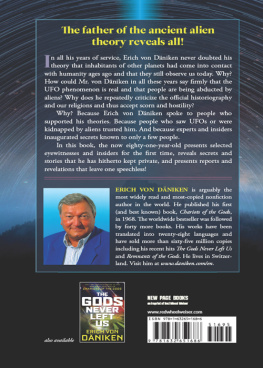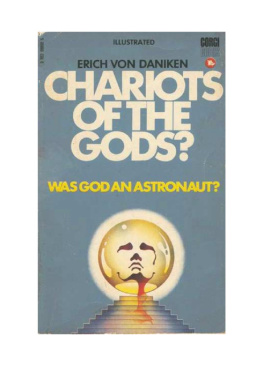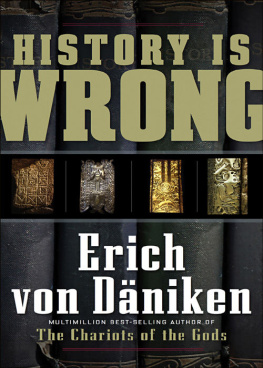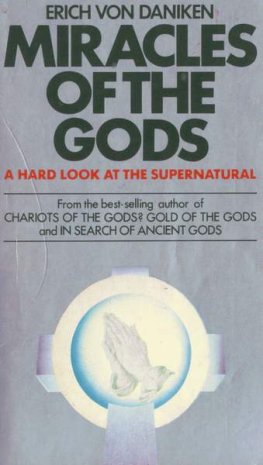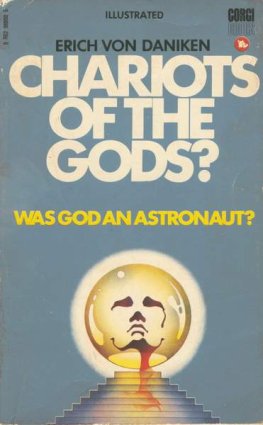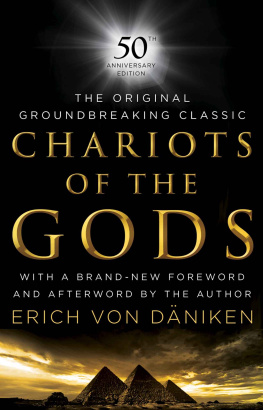The Gods
Were
Astronauts
EVIDENCEOF THETRUEIDENTITIES
OF THEOLD'GODS'
BYERICHVONDNIKEN
Copyright 2011 by Erich von Dniken.
This electronic format is published by Tantor eBooks, a division of Tantor Media, Inc.,
and was produced in the year 2011.
Table of Contents
IT was some 55 years ago, and it happened in the primary school of the town of Schaffhausen in Switzerland. I was about 10 years old and listened to our religious instructor telling us that once a battle had taken place in Heaven. One day the archangel Lucifer had appeared before the throne of God with his legion of angels and had declared, 'We are not going to serve you any more!' At which point the Almighty God had ordered the archangel Michael to chuck Lucifer out of Heaven, along with all his rebellious followers. Michael duly carried out this command with his flaming sword. From that day---according to our R.E. teacher---Lucifer had become the Devil and all his followers were burning in Hell.
That evening, for the first time in my young life, I was really pensive. We children had been told that Heaven was a place of absolute bliss, a place where all the good people went after they died. A place too where all souls became intimately one with God. How could conflict occur in such paradisiacal realms? Where absolute joy ruled, where oneness with God was perfect, there could be no opposition, no quarrel. Why, oh why, should Lucifer and all his angels suddenly rebel against an almighty, all-loving God?
My mother, whom I asked for an explanation, was unable to help. With God, she said, wearing a troubled expression, everything was possible. That's how it had to be. Even the impossible.
Later, at high school, where we were taught Latin, I understood that the name Lucifer was formed out of the two words lux (light) and ferre (to do, to carry). Lucifer really means Light-maker or Bringer of Light. Of all creatures, was the Devil supposed to be the Bringer of Light? My realisation, based on the Latin, made the whole business even more bewildering.
Twenty years later, I had thoroughly studied the Old Testament, as Christians call the ancient traditions. There I read passages from the Jewish prophet Isaiah (c. 740 BC):
How art thou fallen from heaven, O Lucifer, son of the morning! How art thou cut down to the ground, which didst weaken the nations! For thou hast said in thine heart, I will ascend into heaven, I will exalt my throne above the stars of God: I will sit also upon the mount of the congregation... (Isaiah 14, 12-13)
These verses from Isaiah may have been altered during the course of the millennia. But what might he have been thinking about originally? In the so-called 'Revelation' of John (author of the prophecy of the apocalypse) one can read another clear and definite allusion to battles in Heaven in chapter 12, verse 7:
And there was war in heaven: Michael and his angels fought against the dragon; and the dragon fought and his angels, and prevailed not; neither was their place found any more in heaven.
Curious. The great traditions of other peoples too support the idea that these battles in heaven were not entirely made up. In The Egyptian Book of the Dead, a collection of texts that were placed in a grave with a mummified body so the deceased would know how to behave in the Beyond, we read how Ra, the mighty Sun god, fought against the rebellious children of heaven. The god Ra, we read, never left his 'egg' during the entire battle.
Battles in Heaven? In outer space? Or did our ignorant forefathers merely mean the battles between good and evil that are fought within humans? Did they perhaps imagine the atmospheric battle during a thunderstorm and project it on to a battle in outer space? A battle of dark clouds against the Sun? Or did the origin of this bewildering thinking lie in a solar eclipse, where something terrible was trying to eat up the Sun? All these natural explanations do not really take us any further, as I will demonstrate. If the battle between Lucifer and Michael were only to be found in the ancient Jewish sphere, one could easily gloss over it. But it is not the only example, and very old stories only too often show up astonishing similarities.
For thousands of years, Tibetan monasteries preserved texts called dzyan. Some original text, which may or may not still exist, must have been the source of the many dzyan fragments that have turned up in Indian temple libraries. We are talking of hundreds of sheets written in Sanskrit, sandwiched between two pieces of wood. There, one can read that in the 'fourth world age,' the sons were ordered to create likenesses of themselves. A third of the sons refused to carry out the command:
The older wheels turned down and up. The spawn of the Mother filled the All. Battles were fought between the creators and the destroyers, and battles about Space... Do your calculations, Lanoo, if you wish to obtain the true age of your wheel. (author's emphasis)
I discussed parts of Greek mythology in my last book. Greek mythology also begins with a battle in heaven. The children of Ouranos rebelled against the heavenly order and the creator. Terrible battles ensued and the Zeus, the Father of the gods, is only one of the victors. Prometheus was one of those who fought against Zeus, and this took place in 'Heaven,' as Prometheus was the one who stole the fire from Heaven and brought it down to Earth. Prometheus---Lucifer. The Bringer of Light?
On the other side of the world, far from Greece, lies New Zealand. Even a hundred years ago, ethnologist John White was asking the old priests of the Maori about their legends. Their legends too begin with a battle in Heaven. Some of the sons of God rebelled against their father. The leader of these space warriors was called Ronga-mai, and after a victorious battle, he allowed himself to be feted on Earth.
His appearance was like a brilliant star, like a flame, like a sun. Wherever he landed, the Earth was churned up, dust clouds obscured one's view, the noise sounded like thunder and, from a distance, like the rushing sound inside a sea shell.
These accounts cannot just be disposed of by shoving them into the psychologist's bag. A very ancient memory has been preserved here. In the Drona Parva, the oldest Indian tradition, the battles in space are described in the same manner as in old Jewish legends that are not part of the Old Testament. There too, there is mention of 'holy wheels,' 'in which the cherubim reside.' This is, of course, not just anywhere, but 'in Heaven' and 'among the stars.'
Etymologists assure us that one should see all this symbolically. These strange stories are only myths. Only? Which family tree should we climb up, then, if all that is to be found in mythology are symbols? And if they are symbols, what do the symbols stand for? The term 'symbol' comes from the Greek symballein and means 'to throw together.' If myths are only to be perceived symbolically, I would really like to know what exactly has been 'thrown together.' An attempt to side with the vagueness of myths will not take us one step further. We have become a society that simply accepts and believes the most contradictory traditions, believing in the way religions would have us believe. But evidently we are not prepared to accept a few facts. When I maintain that the Holy Book, and the first books of the Old Testament in particular, bristle with contradictions and horror stories, and that the God who spoke to Moses could never be looked upon as the true God of Creation, people become offended and indignantly demand proof. When I present the evidence, I get publicly clobbered for my pains. Why? Because we are not supposed to question beliefs and faith. Of course, that only applies to the beliefs of the larger religious groups. If I attack the beliefs of a smaller group, the rule no longer applies.
Next page
